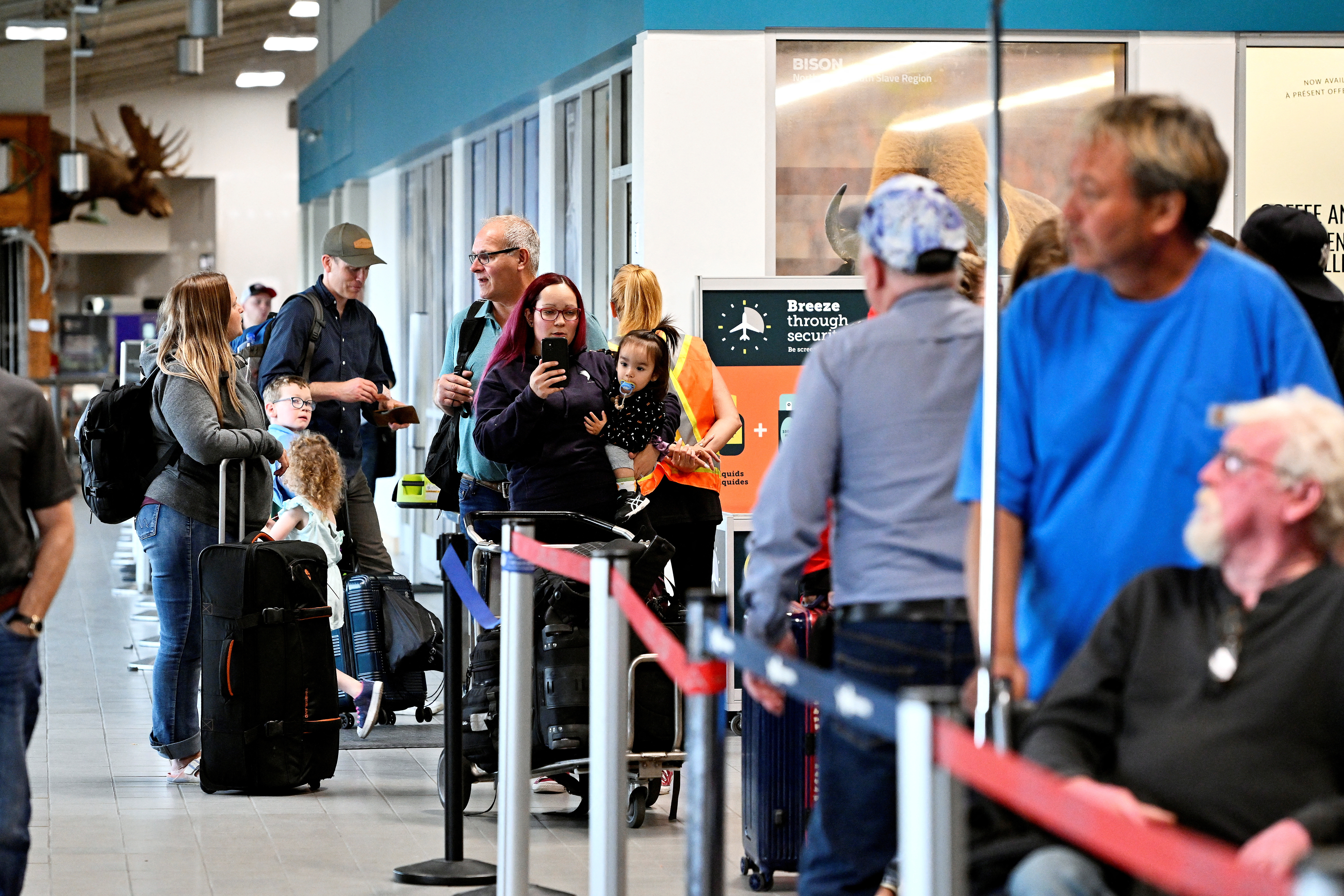
Authorities in Canada’s Northwest Territories are urging residents to leave the capital of Yellowknife by air or land, as crews battle a massive wildfire that prompted an evacuation order for the city of about 20,000 people.
Ten planes left Yellowknife with 1,500 passengers on Thursday, said Jennifer Young at the Northwest Territories’ Department of Municipal and Community Affairs, and the agency hoped another 22 flights will leave on Friday with 1,800 more passengers.
Thousands of people also have fled in their vehicles, driving hundreds of kilometres to safety, as the worst fire season on record in Canada showed no signs of easing.
Canada’s Minister of National Defence Bill Blair said on Friday afternoon that half of the population of the Northwest Territories, a sprawling area home to some 45,000 people, had been displaced by the “unprecedented” blazes.
“We will do whatever it takes to make sure you can return to your communities and livelihoods as quickly as possible,” Blair said during a news conference, pledging the federal government’s support. “We know that conditions remain difficult,” he added.

The Northwest Territories issued a state of emergency on Tuesday as more than 200 wildfires burned across the territory in northern Canada. Authorities also ordered all Yellowknife residents to evacuate by noon local time (18:00 GMT) on Friday.
“Nobody envisioned an event of this scale. It’s still really stressful. There are a lot of people still left in Yellowknife that are freaking out,” said resident Tebbia Teoncey, who was evacuated to Edmonton, Alberta.
The massive fire to the northwest of Yellowknife only advanced by around one kilometre (0.6 miles) on Thursday, officials said, because it was held back by winds.
It is now about 15km (9 miles) away from the city and authorities expect the fires to reach the outskirts of the city by the weekend.
“We’re heading into a critical couple of days in management of this wildfire,” Mike Westwick, the fire information officer for Yellowknife, told reporters on Thursday.
“Those are winds that will trend both of those fires in directions that we don’t want,” he added.
Canadian Prime Minister Justin Trudeau has pledged his government’s support and members of the Canadian Armed Forces also have been sent to the Northwest Territories to help fire crews battle the flames.
Today, Prime Minister @JustinTrudeau convened a meeting of the Incident Response Group to discuss the wildfires in the Northwest Territories. @CanadianForces personnel and aircraft are deployed to support emergency response efforts – and we’ll continue to be there to help. pic.twitter.com/zu0T82WRbf
— Bill Blair (@BillBlair) August 17, 2023
Canada has experienced a record number of wildfires so far this year, with more than 5,500 blazes prompting evacuations across the country.
Over the past months, several areas – including British Columbia and Alberta in the west, to Ontario, Quebec, Nova Scotia and New Brunswick in the east – have battled wildfires, some of which sent massive plumes of smoke to parts of the United States and Europe.
Experts have pointed to climate change as worsening the size and scope of wildfires in Canada and around the world, as high temperatures and other factors lead to earlier and more destructive fire seasons.
As of Thursday, more than 1,000 fires were burning across Canada and 671 of them were considered out of control, a Canadian interagency fire tracker reported. In the Northwest Territories alone, 236 fires were active.
More than 21,000 square kilometres (8,100 square miles) have burned so far this year across the territory, according to the government.
“We’re all tired of the word unprecedented, yet there is no other way to describe this situation in the Northwest Territories,” Caroline Cochrane, premier of the Northwest Territories, wrote on social media earlier this week.

The evacuation of Yellowknife was by far the largest in 2023, said Ken McMullen, president of the Canadian Association of Fire Chiefs and fire chief in Red Deer, Alberta.
“It’s one of those events where you need to get people out sooner rather than later” because fire could block the only escape route before ever reaching the community, he said.
Yellowknife Mayor Rebecca Alty said the fire was not the only concern either. “With the heavy smoke that will be approaching we encourage all residents to evacuate as soon as possible,” she said.
Meanwhile, a state of emergency has been declared in Kelowna, British Columbia, a city about 400km (249 miles) northeast of Vancouver that is home to about 150,000 residents.
“Residents under Evacuation Alert are advised to be ready to leave their home at a moment’s notice,” the City of Kelowna said in a statement early on Friday, adding that people should prepare to be away from their home for an extended period of time.
The evacuation orders were issued after blazes that were discovered on Tuesday jumped Lake Okanagan, sparking spot wildfires in Kelowna.
#BREAKING The #McDougallCreekWildfire has jumped Okanagan lake into Kelowna. Hundreds of residents along Clifton Rd in Kelowna are packing up and leaving. #BCWildfire #WestKelowna pic.twitter.com/UB6gRCVZUK
— Jamie Tawil (@JamieTawil) August 18, 2023







